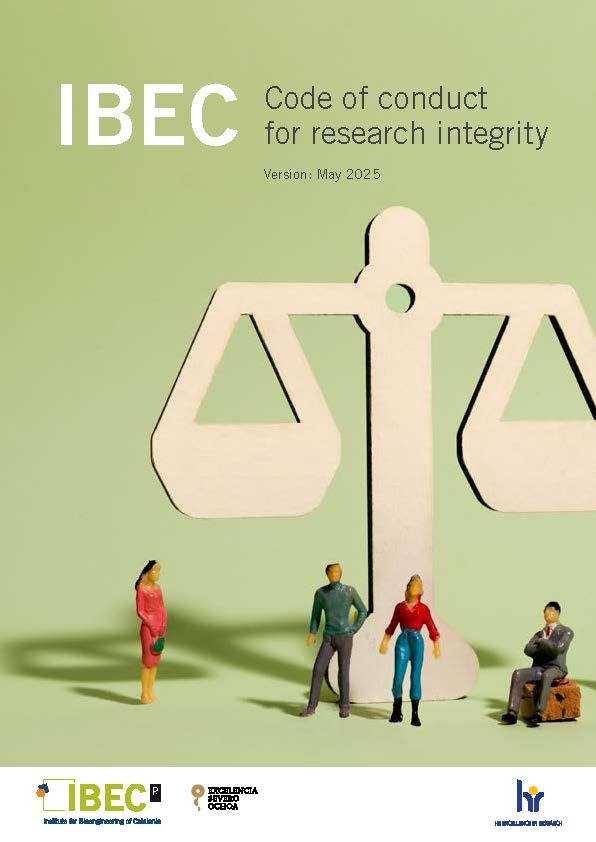Code of Conduct for Research Integrity
The IBEC Code of Conduct for Research Integrity (the Code) is one of the actions within the framework of the Human Resources Strategy for Researchers (HRS4R) according to the European Charter & Code.

The Code is a framework for good research practice, setting the criteria for proper research behavior and establishing an environment conducive to high-quality research, thus ensuring that research is conducted according to international ethical standards.
The Code complements IBEC policies and procedures such as those for health and safety, working conditions, intellectual property, and does not replace them. Its content is complementary to the laws in force.
Together with the promotion of the Code, IBEC wants to take a proactive role providing training to researchers in this respect throughout their careers and raising awareness on the subject, thus preventing future problems.
The Code sets out the ethical standards and standards of research conduct and sets out principles, recommendations and commitments. By making clear the conduct that is expected and considered effective, the Code contributes to an atmosphere of openness.
The most up-to-date version of the Code can be accessed here.
The Code applies to and should be known by all professionals linked to IBEC at all career stages, so please read it carefully.
IBEC’s Commission for Research Integrity
The Commission for Research Integrity is a body with a double role: on the one hand it has an advisory role; on the other it makes decisions on misconduct cases. Its main responsibilities are:
- To promote and safeguard good research practice at IBEC.
- To promote awareness and training for researchers at all career stages.
- To monitor compliance with the Code and update it regularly.
- To deal with allegations of research misconduct.
Complaints, information, alerts, allegations or reports of research misconduct regarding acts or omissions arising or that have arisen within the scope of IBEC’s activities and that constitute an infringement must be communicated through IBEC’s Ethical Channel. The Complaints, information, alerts, allegations, reports of research misconduct will be governed by the Ethical’s Channel Policy and, on an ancillary basis, by the Procedure for Managing Information Received.
If a person is unsure whether or not a suspected incident is considered research misconduct, he/she may contact any member of the Commission for Research Integrity to discuss it informally and confidentially. Contact email: integrity@ibecbarcelona.eu. Communications via this email will be received by the Secretary of the Commission.
The Commission for Research Integrity will appoint 3 members from among its 9 components for advising the Collegiate Body of the Ethical Channel, if necessary.
The members of the Commission are (renewed at 23/03/2023):
| Sergi Camacho | Managing Director |
| Jordi Comelles | Senior researcher, Biomimetic systems for cell engineering |
| Alba Herrero | PhD student, Molecular imaging for precision medicine |
| Santiago Marco | Group leader, Targeted therapeutics and nanodevices |
| Carolina Marí | Head of Human Resources |
| Elisabeth Engel | Group leader, Biomaterials for regenerative therapies group |
| Silvia Muro | Group leader, Targeted therapeutics and nanodevices group |
| Josep Samitier | Director |
| Teresa Sanchis (Secretary of the Commission) | Head of Strategy |
Integrity Pills bulletin
Integrity Pills is a monthly bulletin that briefly informs on current research integrity issues, aiming to create awareness about it at IBEC. It includes three sections: news to reflect current issues, studies to learn and resources to improve practices.
Started: September 2024
| Bulletin | News | Studies | Resources |
| Sep. 2024 | China conducts nationwide audit of researchmisconduct after thousands of papers retracted lastyear Chemistry World (16/02/2024) | Dror Kolodkin-Gal. AI and the future of image integrity in scientific publishing. Sci Edi, 47 (1) (2024). https://doi.org/10.36591/SE-4701-02 | ALLEA. The European Code of Conduct for Research Integrity. Revised Edition 2023. Berlin. https://doi.org/10.26356/ECOC |
| Oct. 2024 | Spanish university head accused of inflating citations to his own work. Science (27/09/2024) | Meursinge Reynders, R.A., Cavagnetto, D., ter Riet, G.et al. Automatically listing senior members of departments as co-authors is highly prevalent inhealth sciences: meta-analysis of survey research. Sci Rep, 14, 5883 (2024). https://doi.org/10.1038/s41598-024-55966-x | GAIN: Global Academic Integrity Network. https://www.globalacademicintegrity.network/ |
| Nov. 2024 | Research managers called on to help protectIndigenous knowledge. Nature Index (25/10/2024) Related news: Indigenous people accuse radiologists of secretlystudying their organs. The Washington Post (23/09/2024) | Kim, H., Park, J., Ahn, S. et al. The impact of sex/gender-specific funding and editorial policies on biomedical research outcomes: a cross-nationalanalysis (2000–2021). Sci Rep, 14, 26599 (2024). https://doi.org/10.1038/s41598-024-77018-0 | Research Integrity and Peer Review journal. https://researchintegrityjournal.biomedcentral.com/ |
| Dec. 2024 | Like ‘old Twitter’: The scientific community finds anew home on Bluesky. Science (20/11/2024). | Reisman, Richard. New Logics for Governing Human Discourse in the Online Era. Centre for International Governance Innovation (2024). http://www.jstor.org/stable/resrep59652 | Ethical issues in research using social media. UKRIO, 2024. https://ukrio.org/ukrio-resources/ethical-issues-in-research-using-social-media/ |
| Jan. 2025 | Science sleuths are using technology to find fakery and plagiarism in published research. by Carla K.Johnson, Associated Press (28/01/2024). Related: Introducing the Retraction Watch Sleuth in Residence Program (02/01/2025) | Mora P., Pilia, S. A proposed framework to address metric inflation in research publications. Accountability in Research, 1–22 (2024). https://doi.org/10.1080/08989621.2024.2445280 | The Retraction Watch Database https://retractiondatabase.org/RetractionSearch.aspx? |
| Feb. 2025 | A shady business operated out of a British mansion is buying up scientific journals to earn millions by publishing mediocre studies. by Manuel Ansede, El País (31/01/2025) | Eaton, S.E. Future-proofing integrity in the age of artificial intelligence and neurotechnology: prioritizing human rights, dignity, and equity. Int J Educ Integr, 20, 21 (2024). https://doi.org/10.1007/s40979-024-00175-2 | PubPeer https://pubpeer.com/ |
| Mar. 2025 FOCUS: Research Integrity in Spain | Acabar con la mala ciencia: por qué España necesita una oficina de integridad de la investigación. by Pampa García, El Diario (16/10/2023). [in Spanish] | Candal-Pedreira, C., Álvarez-Dardet, C., Ruano-Ravina, A., & Pérez-Ríos, M. La Oficina de Integridad Científica en España. Una tarea pendiente [The Research Integrity Office in Spain. A pending issue]. Gaceta sanitaria, 36(6), 557–560 (2022). [in Spanish] https://doi.org/10.1016/j.gaceta.2022.02.005 | Official organisms Spain Comité Español de Ética de la Investigación (CEEI) (advisory body) > Jordi Camí, presidente del comité de ética: “La autonomía universitaria debería tener límites” Catalunya Comitè per a la Integritat de la Recerca a Catalunya (CIR-CAT) (advisory body) Non official organisms Oficina Española de Integridad en la Investigación (association) |
| Apr. 2025 CASE: The Macchiarini Case | Disgraced surgeon Paolo Macchiarini, whose crimes inspired an opera, headed to prison. by Gretchen Vogel, Science (18/12/2023). · Paolo Macchiarini (Wikipedia) · The Macchiarini case: Timeline (News from Karolinska Institutet) · The Dashing Italian Surgeon Who Seduced a Reporter to Mask His Bloody Crimes. Netflix docuseries Bad Surgeon chronicles conman Paolo Macchiarini’s reign of terror — resulting in broken hearts and seven dead bodies. by Chris Vognar, Rolling Stone (29/11/2023) | Karolinska Institutet’s Action plan following the Macchiarini case investigations. Numerous measures have been implemented as a result of the deficiencies identified in connection with the Macchiarini case. Specially interesting is the section of The prevention of scientific misconduct. | Researcher Riddles (Springer Nature): – Introduction to Research Integrity – Image manipulation Conflicts of interest – Predatory Publishers Courses: – Avoiding paper mills as an author – Research Integrity: An Introduction for Researchers |
| May 2025 | Trump’s NIH Ditches Its Scientific Integrity Policy. That’s Bad News for Public Trust in Government Science. by Liz Borkowski, The Equation (01/04/2025). Related: Keeping Track: Mapping the Trump Administration’s Attacks on Science and Health | Kong L, Liu S, Liu L, et al. How exploitative leadership undermines subordinates’ taking charge behavior? A moderated mediation model. BMC Psychol, 13, 479 (2025). https://doi.org/10.1186/s40359-025-02791-0 | EMBO: Resources to foster research integrity https://www.embo.org/policy/research-integrity/resources-to-foster-research-integrity/ This page features some helpful resources for research performing organizations to create and maintain research integrity at institutional level, and for researchers to safeguard good research practice. |
| Jun. 2025 | ‘Unethical’ AI research on Reddit under fire: Ethics experts raise concerns over consent, study design. by Cathleen O’Grady, Science (30/04/2025) | Resnik, D.B., Hosseini, M. The ethics of using artificial intelligence in scientific research: new guidance needed for a new tool. AI Ethics, 5: 1499–1521 (2025). https://doi.org/10.1007/s43681-024-00493-8 Our colleague Galyna Maleeva has recently published this article related to the AI ethics issue: Ungureanu C. y Maleeva G. Bioengineering, AI Spirituality, and Environmental Crisis: Ishiguro’s Posthuman Humanism. Res Publica. Revista de Historia de las Ideas Políticas, 28(1): 97-104 (2025). https://doi.org/10.5209/rpub.99321 | UNESCO Recommendation on: Ethics of Artificial Intelligence https://www.unesco.org/en/artificial-intelligence/recommendation-ethics |
| Jul. 2025 | Transparent peer review to be extended to all of Nature’s research papers. Nature Editorial (16/06/2025) | Tony Ross-Hellauer, Serge P J M Horbach. Additional experiments required: A scoping review of recent evidence on key aspects of Open Peer Review. Research Evaluation, 33: rvae004 (2024). https://doi.org/10.1093/reseval/rvae004 | Reviewer Credits: Resources for Peer Reviewers https://www.reviewercredits.com/useful-resources-for-peer-reviewers/ |
| Oct. 2025 | IBEC has a new section on Research Integrity at it’s website. It collects the information related to this issue at the Institute such as policies, organs, news, etc. Find it at: Home > About Us > Research Integrity. Also, will find there an updated version (approved last May 2025) of the Code of Conduct for Research Integrity, briefly explained below at the Resources section. | Suchak T, Aliu AE, Harrison C, Zwiggelaar R, Geifman N, et al. (2025) Explosion of formulaic research articles, including inappropriate study designs and false discoveries, based on the NHANES US national health database. PLOS Biology 23(5): e3003152. https://doi.org/10.1371/journal.pbio.3003152 | IBEC Code of Conduct for Research Integrity (2025) https://ibecbarcelona.eu/wp-content/uploads/2025/08/2025_04_24-IBEC-Code-of-Conduct.pdf The Code has been updated to include o review issues like: – The use of the Ethical Channel as the way to communicate misconduct cases; – Incorporation of sustainability; Incorporation of psychological safety in teams; – Artificial Intelligence use; – Simplification of regulations regarding animal experimentation, GMOs, human samples…; – Incorporation of the sex/gender perspective in Research; – Incorporation of DORA in the evaluation of researchers. |
| Nov. 2025 | Investing in infrastructure for animal replacement methods (National Centre for the Replacement, Refinement & Reduction of Animals in Research -NC3Rs-, 16 October 2025) The NC3Rs has published a report highlighting the impacts of the first UK funding call for infrastructure to strengthen national capabilities in methods that replace the use of animals. https://nc3rs.org.uk/news/investing-infrastructure-animal-replacement-methods | Pippin, J.J., Bailey, J., Kennedy, M. et al. (2025) Institutional animal care and use committees and the challenges of evaluating animal research proposals. Res Integr Peer Rev, 10: 11. https://doi.org/10.1186/s41073-025-00169-9 | Resources related with animals use in science in IBECs framework: IBEC Code of Conduct for Research Integrity (2025) – Animal experiments (p. 11) https://ibecbarcelona.eu/wp-content/uploads/2025/08/2025_04_24-IBEC-Code-of-Conduct.pdf PCB’s: Comitè Ètic d’Experimentació Animal (CEEA) https://www.pcb.ub.edu/serveis/comite-etic-dexperimentacio-animal-ceea/ Generalitat de Catalunya: Utilització d’animals en experimentació https://mediambient.gencat.cat/ca/05_ambits_dactuacio/patrimoni_natural/animals_companyia_experimentacio/utilitzacio_animals_experimentacio/index.html Ministerio de Ciencia Innovación y Universidades: Investigar > Protección de los animales usados en investigación https://www.ciencia.gob.es/Investigar.html European Comission: Animals in science https://environment.ec.europa.eu/topics/chemicals/animals-science_en?prefLang=es |

